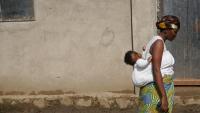Intervening to improve birth weight and infant respiratory health in rural Ghana

Across the developing world, 3 billion people live in households where biomass fuels are used for cooking or heating. Smoke from biomass combustion leads to approximately 1.6 million excess annual deaths and a substantial share of the global burden of disease, due in large part to increased risk of acute lower respiratory infections (ALRI) in children under age five. ALRI is the leading cause of death in children under age five in developing countries. Recent evidence also suggests that exposures to cooksmoke during pregnancy may be associated with reduced birth weight. Unfortunately, most evidence to-date on health effects among children from biomass smoke derives from cross-sectional studies for which residual confounding cannot be excluded. Furthermore, no reliable exposure/response information is yet available for sub-Saharan Africa, where cooking with biomass fuels is widespread. In rural Ghana, for example, our preliminary studies have shown that 94% of households cook with biomass fuels.
The overall goal of the proposed research is to test the effectiveness of commercially available, low cost improved cook stoves in improving infant health outcomes from birth through six months of age. Demonstration of these benefits could support a program to include improved stoves as part of the standard prenatal care package for women in Ghana.